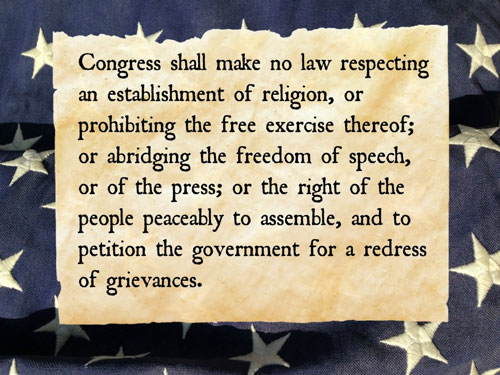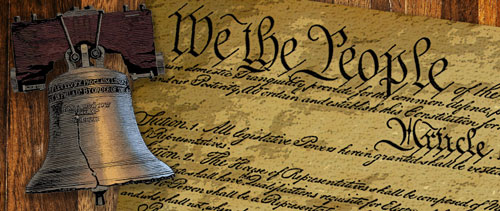
Will the Religious Freedom Peace Tax Fund bill protect only those who base their conscientious objection on religious belief?
The addition of the words “religious freedom” to the name of the bill has not changed the individuals who would be covered under the Religious Freedom Peace Tax Fund bill. It has always been a bill about the First Amendment “free exercise” freedoms, which, although this includes many kinds of belief, is generally referred to as a “religious freedom.” This is a legal term which excludes no one, whether religious of not. Conscientious objector status in the Peace Tax Fund bill is defined as following the Selective Service System definition. The language of this definition of conscientious objection as it was written in 1940 is very restrictive and excludes non-religious objectors. However, case law since then has broadened the definition considerably to include “a meaningful belief occupying in the life of its possessor a place parallel to the filled by God or those admittedly qualified for the exemption” The Religious Freedom Peace Tax Fund bill would inherit this case law.
(To find out more about case law, see our book Conscience and the Courts)

Wouldn’t the entire federal system collapse if we had a tax system premised on individuals giving only to those government programs they support? For example, some would prefer not to pay for welfare or education?
All taxpayers would “prefer” not to pay for one or another government program. Personal preferences, however, are not the same as deeply held conscientious convictions based on long-standing and universally recognized religious, moral, and ethical teachings. Under the Religious Freedom Peace Tax Fund bill, individual tax payers will not be able to specify where their money would go, nor will their participation in the Peace Tax Fund directly decrease the amount of money spent on war – this would violate the constitutionally given powers of Congress to determine spending priorities. The Religious Freedom Peace Tax Fund bill establishes a method by which conscientious objectors’ tax dollars would go into a separate fund which could be used for non-military uses only. The Religious Freedom Peace Tax Fund bill, is therefore not a threat to the tax system.
If the Religious Freedom Peace Tax Fund bill does not change the nation’s spending priorities, what is the point?
The Religious Freedom Peace Tax Fund bill would be another step in the decriminalization of conscientious objection, broadening the rights of conscience to include objection to military taxation. Consider these implications:
Conscientious objection to military taxation would legally parallel conscientious objection to military service. The work performed by conscientious objectors during the draft did not result in fewer soldiers going to war. Likewise, the tax dollars contributed by conscientious objectors to the Peace Tax Fund would not change budgetary priorities. Yet this does not diminish the power of either moral stand.
Each year, tens of millions of taxpayers would receive tax forms with information about the availability of conscientious objector status, causing many to examine their consciences regarding participation in war.
The level of participation in the Peace Tax Fund would be published in the Congressional Record every year. This information would be the most comprehensive and visible barometer for judging the nation’s conscience regarding participation in war and could build momentum toward changing military spending priorities.

Wouldn’t the Religious Freedom Peace Tax Fund bill set a precedent for taxpayers with scruples about paying for federally funded abortions?
The pro-life movement is not waiting for the Peace Tax Fund to pave its way. Since the 1980’s, it has successfully passed amendments to the federal budget that severely restrict federal funding of abortions. The Peace Tax Fund concept is not a practical route for the pro-life movement because abortion spending is virtually, if not completely, non-existent in the federal budget. By comparison over 50% of U.S. tax dollars pay for current military programs and interest on debts incurred by past military spending.
Would the Religious Freedom Peace Tax Fund bill open the door to a flood of special exemptions?
In examining the bill, the Congressional Research Service wrote, “Recognition of the special moral dilemma faced by those who must pay taxes in support of military activities to which they are opposed will not open a Pandora’s box to claims by other persons.”
Historically and legally, objection to participation in war has held a unique place in our nation. Almost all American colonial governments made special provision for conscientious objectors, as did the first Continental Congress. During World War I, hundreds of conscientious objectors suffered, and some died, in American prisons for their beliefs. In 1940, Congress passed legislation recognizing conscientious objection to military service. In the words of the Congressional Research Service, “The plight of individuals who will be benefited under [the Peace Tax Fund Bill] is worthy of special consideration in view of the fundamental moral basis of their claims and the historically recognized unique status of conscientious objectors.”

What is the projected effect of the Religious Freedom Peace Tax Fund bill on overall revenue?
The Report on the bill by the Congressional Joint Committee on Taxation states that implementation of the Peace Tax Fund concept would slightly increase revenue to the government. There will certainly be a savings from increased compliance and a decrease in the current expenses to enforce collections from conscientious objectors who are war tax resisters. Also, those who purposely keep their incomes low to avoid contributing to military spending would be able to earn to their potential, thus increasing the amount of income available to the government.
Shouldn’t all taxpayers have a responsibility to take part in the collective defenses of the country?
The Religious Freedom Peace Tax Fund bill would allow conscientious objectors to strengthen and defend the country in ways other than military force. Those eligible to participate in the Peace Tax Fund would pay 100% of their federal taxes. The money, however, would not pay for weapons and military might, it would go instead to solve the problems that lead to the conflicts which “necessitate” military intervention: hunger, poverty, injustice, and lack of equal education and opportunity. Conscientious objectors believe this a more effective and moral way to defend their country and their world.
What protection is provided against capricious and spurious claims?
It is assumed screening will occur only as part of any routine audit. The point is not to overburden either the IRS or the judicial system. While previous versions of the bill have required an essay stating one’s belief about war, the new version of the bill does not specify administrative details. We recognize that malcontents and others who simply disagree with current administration policy may try to take advantage of this opportunity to misuse the provision. However, since tax payments would not be reduced, there is no incentive to be dishonest (in contrast to a military draft in time of war). We believe that lack of financial incentives for false claims and the structure of the filing process are sufficient and will not cause an undue burden on the IRS.
